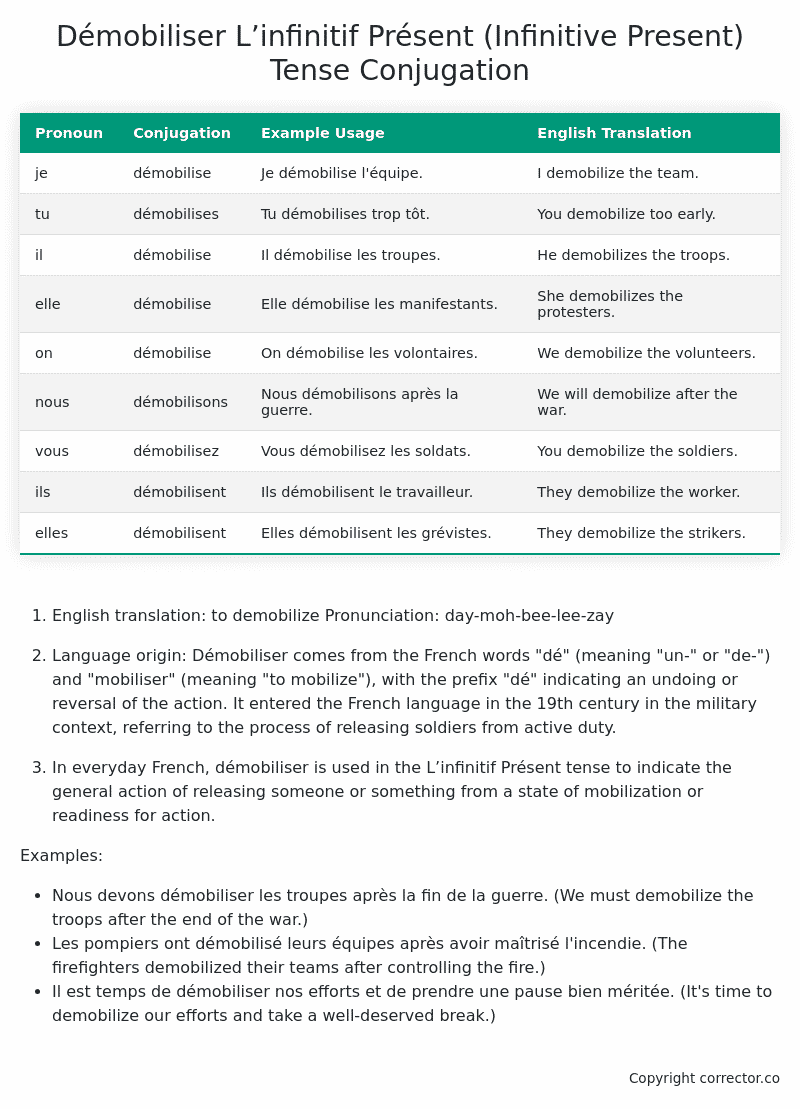L’infinitif Présent (Infinitive Present) Tense Conjugation of the French Verb démobiliser
Introduction to the verb démobiliser
-
English translation: to demobilize
Pronunciation: day-moh-bee-lee-zay -
Language origin: Démobiliser comes from the French words “dé” (meaning “un-” or “de-“) and “mobiliser” (meaning “to mobilize”), with the prefix “dé” indicating an undoing or reversal of the action. It entered the French language in the 19th century in the military context, referring to the process of releasing soldiers from active duty.
-
In everyday French, démobiliser is used in the L’infinitif Présent tense to indicate the general action of releasing someone or something from a state of mobilization or readiness for action.
Examples:
- Nous devons démobiliser les troupes après la fin de la guerre. (We must demobilize the troops after the end of the war.)
- Les pompiers ont démobilisé leurs équipes après avoir maîtrisé l’incendie. (The firefighters demobilized their teams after controlling the fire.)
- Il est temps de démobiliser nos efforts et de prendre une pause bien méritée. (It’s time to demobilize our efforts and take a well-deserved break.)
Table of the L’infinitif Présent (Infinitive Present) Tense Conjugation of démobiliser
| Pronoun | Conjugation | Example Usage | English Translation |
|---|---|---|---|
| je | démobilise | Je démobilise l’équipe. | I demobilize the team. |
| tu | démobilises | Tu démobilises trop tôt. | You demobilize too early. |
| il | démobilise | Il démobilise les troupes. | He demobilizes the troops. |
| elle | démobilise | Elle démobilise les manifestants. | She demobilizes the protesters. |
| on | démobilise | On démobilise les volontaires. | We demobilize the volunteers. |
| nous | démobilisons | Nous démobilisons après la guerre. | We will demobilize after the war. |
| vous | démobilisez | Vous démobilisez les soldats. | You demobilize the soldiers. |
| ils | démobilisent | Ils démobilisent le travailleur. | They demobilize the worker. |
| elles | démobilisent | Elles démobilisent les grévistes. | They demobilize the strikers. |
Other Conjugations for Démobiliser.
Le Present (Present Tense) Conjugation of the French Verb démobiliser
Imparfait (Imperfect) Tense Conjugation of the French Verb démobiliser
Passé Simple (Simple Past) Tense Conjugation of the French Verb démobiliser
Passé Composé (Present Perfect) Tense Conjugation of the French Verb démobiliser
Futur Simple (Simple Future) Tense Conjugation of the French Verb démobiliser
Futur Proche (Near Future) Tense Conjugation of the French Verb démobiliser
Plus-que-parfait (Pluperfect) Tense Conjugation of the French Verb démobiliser
Passé Antérieur (Past Anterior) Tense Conjugation of the French Verb démobiliser
Futur Antérieur (Future Anterior) Tense Conjugation of the French Verb démobiliser
Subjonctif Présent (Subjunctive Present) Tense Conjugation of the French Verb démobiliser
Subjonctif Passé (Subjunctive Past) Tense Conjugation of the French Verb démobiliser
Subjonctif Imparfait (Subjunctive Imperfect) Tense Conjugation of the French Verb démobiliser
Conditionnel Présent (Conditional Present) Tense Conjugation of the French Verb démobiliser
Conditionnel Passé (Conditional Past) Tense Conjugation of the French Verb démobiliser
L’impératif Présent (Imperative Present) Tense Conjugation of the French Verb démobiliser
L’infinitif Présent (Infinitive Present) Tense Conjugation of the French Verb démobiliser (this article)
Struggling with French verbs or the language in general? Why not use our free French Grammar Checker – no registration required!
Get a FREE Download Study Sheet of this Conjugation 🔥
Simply right click the image below, click “save image” and get your free reference for the démobiliser L’infinitif Présent tense conjugation!

Démobiliser – About the French L’infinitif Présent (Infinitive Present) Tense
Forming the Infinitive Present
Common Everyday Usage Patterns
As a Verb’s Dictionary Form
After Modal Verbs
As an Imperative
In Infinitive Clauses
Interactions with Other Tenses
Present Tense
Future Tense
Conditional Tense
Passé Composé
Imperfect Tense
Subjunctive and Conditional Moods
Summary
Want More?
I hope you enjoyed this article on the verb démobiliser. Still in a learning mood? Check out another TOTALLY random French verb conjugation!


